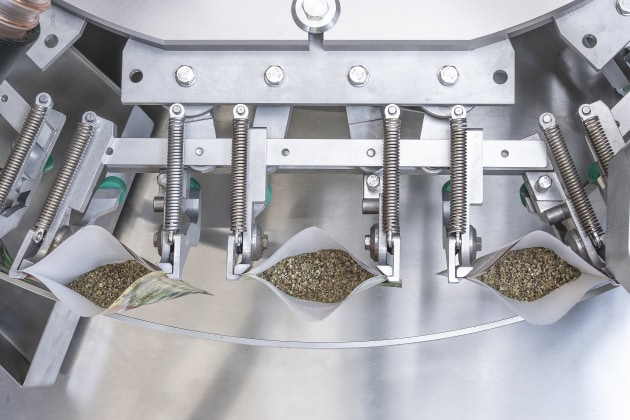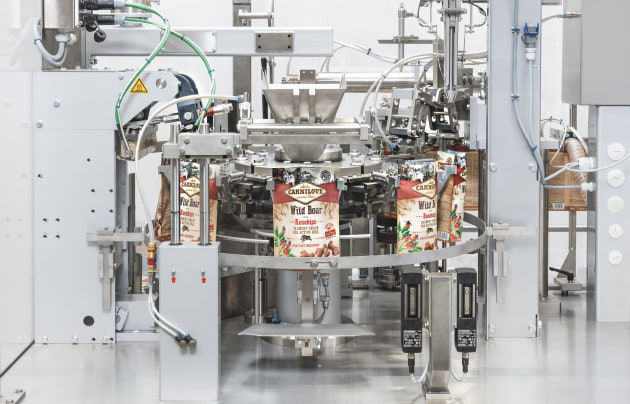In today’s competitive retail environment, standing out on shelf is more than a design challenge – it’s a packaging strategy. Pouch packaging offers wide appeal, but its success is rooted in having the right equipment solution.

Flexible formats like stand-up pouches are rapidly becoming a go-to solution for manufacturers across food, beverage, pet care and non-food sectors alike. But as demand grows, so too does the question: is pouch packaging the right fit for your products?
The appeal is clear. Stand-up pouches deliver a premium, upright presence with generous print real estate, ideal for brands looking to make an impact at point-of-sale. But the benefits don’t stop at shelf appeal.
From a consumer perspective, pouches offer convenience, portability, and in many cases, resealability – features that continue to drive purchasing decisions across categories.
For manufacturers, the advantages can be even more compelling. The format can allow for direct-to-case, shelf-ready packing, reducing the need for additional cartons or inserts. This not only helps to lower packaging costs, but also supports growing sustainability targets by minimising material use and streamlining the supply chain.
“Stand-up pouches give manufacturers greater control – from how their products are presented at retail, to how efficiently they move through production and into distribution,” says Peter Pontikis, managing director at Nupac Industries. “When paired with shelf-ready trays, they can eliminate the need for excess packaging and increase process efficiency.”
Assessing fit: where volume meets format
While pouch packaging offers wide appeal, the right equipment solution depends on production scale, format flexibility, and long-term operational goals.

Lower volume, high flexibility operations
For businesses managing lower volumes, seasonal product lines or emerging brands, pre-made pouch machines are often the most practical starting point. These systems are ideal for applications where quick changeovers and format versatility are key.
Manufacturers in the food, beverage, home care, personal care and chemical sectors commonly rely on pre-made pouch filling solutions for their adaptability. Nupac partners locally with Linapack, a trusted global supplier of pre-made pouch and sachet equipment, to provide these compact, reliable systems that suit a wide variety of pouch styles and product types.
Higher volume, cost-driven production

For operations focused on throughput and cost efficiency, transitioning to horizontal or vertical form-fill-seal (HFFS/VFFS) equipment offers a clear advantage. These systems form pouches or bags from reel stock, reducing packaging costs per unit and enabling high-speed automation with lower labour requirements.
As demand increases, these solutions allow manufacturers to take greater ownership of their packaging processes – removing reliance on third-party pouch suppliers and gaining flexibility in format, materials and output. Such solutions can also be utilised by manufacturers to product their own pre-made, Gualapack style pouches, giving them more control over costs and their supply chain.
“We’ve seen strong results from Australian manufacturers who’ve implemented SN Maschinenbau’s HFFS technology with our support,” says Pontikis. “It’s helped them scale up production while reducing costs and improving quality control.”
When should manufacturers make the shift?
The right time to upgrade from pre-made pouch solutions to reel-fed systems depends on several factors – but production volume is often the clearest indicator.
Once the cumulative cost of purchasing pre-made pouches outweighs the material and labour savings of producing them in-house from reel stock, investing in high-speed form-fill-seal equipment can make strong financial sense.
“It’s a conversation worth having early,” says Pontikis. “We often work with manufacturers to model their volumes and packaging costs, helping identify whether an investment now will lead to significant long-term savings. In many cases it does. But we also recognise that for some businesses, pre-made formats remain the right choice – and we help them scale within that space as well.”
A smarter way to scale
There is no one-size-fits-all answer when it comes to pouch packaging. That’s why Nupac works closely with local manufacturers to evaluate current line capabilities, growth forecasts, and packaging needs – offering a consultative approach that aligns investment with long-term strategy.
With access to both flexible start-up lines and high-speed automation systems from trusted partners like Linapack and SN Maschinenbau, Nupac supports the full journey – from product concept to high-volume execution.
In a world where presentation, efficiency and cost control are more important than ever, scaling smarter means knowing when to adapt – and having the right partner to help guide the way.
This article was first published in the May-June 2025 print issue of PKN Packaging News, p62.





